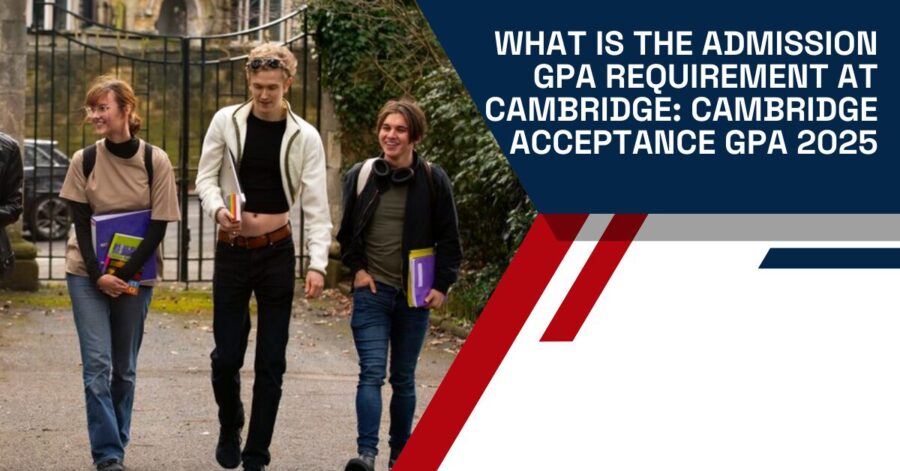15 October 2024
7 minutes read
What Is The Admission GPA Requirement At Cambridge: Cambridge Acceptance GPA 2025

Key Takeaways
- Cambridge takes a flexible, holistic approach to GPA, focusing on your overall academic profile, not just one number.
- Excelling in standardized tests, personal statements, and recommendations can strengthen your application beyond just GPA.
- Submitting a well-rounded, early application with strong supplementary materials and interview prep will boost your chances.
For aspiring students looking to attend the prestigious University of Cambridge, the admissions process can be both exciting and daunting. Among the many factors considered, your Grade Point Average (GPA) plays a crucial role. In this comprehensive guide, we’ll delve into the Cambridge acceptance GPA in 2025, explore acceptance rates, and provide valuable insights for prospective applicants.
What Are The Cambridge Admission Requirements?
When aiming for Cambridge, it’s essential to understand the rigorous standards the university upholds. Cambridge is not just a university; it’s an institution with a rich history and a tradition of academic excellence. Here, we’ll break down the key factors that influence your chances of gaining admission. Make sure you have a clear idea of the full time study hours in the UK as well.

Understanding Cambridge
The University of Cambridge, founded in 1209, is one of the world’s oldest and most esteemed institutions of higher learning. Its reputation for academic excellence spans centuries, attracting students from all corners of the globe. Make sure to understand whether it falls under the GRE accepting universities in the UK.
Cambridge’s Acceptance Rate
With an acceptance rate hovering around 20%, Cambridge is undoubtedly among the most selective universities globally. Each year, thousands of hopeful applicants compete for limited spots, making it essential to stand out in every aspect of your application. Have a clear idea of whether UK universities require SAT.
What Are The Entry Requirements To Get Into Cambridge?
Cambridge sets stringent entry requirements for all prospective students. Meeting these prerequisites is the first step towards securing a coveted spot at this prestigious institution.
GPA Requirement
While Cambridge primarily focuses on A-levels, IB, or other qualifications for UK students, international students’ GPAs can be crucial. It’s important to note that Cambridge doesn’t have a strict minimum GPA requirement. However, a strong academic record is essential. Although there are many distance universities in the UK, having a clear idea of what you want from your education helps you make a quicker decision.
Test Scores Matter
In addition to your GPA, standardized test scores play a significant role in your application. Cambridge considers SAT or ACT scores, and achieving a high score in these tests is vital to make your application competitive. Understand whether Cambridge requires GRE as well.
Advanced Placement (AP) Exams
High scores on Advanced Placement (AP) exams can bolster your application. If you have taken AP courses, consider taking the exams to demonstrate your proficiency in specific subjects.
What Are The GPA Requirements for Cambridge Admission?
The GPA requirements for Cambridge admission are a critical aspect of your application, especially for international students. Understanding how Cambridge evaluates your GPA and what they expect from applicants is essential for a successful application. Have a clear idea of the cost of studying in the UK for international students.
Cambridge’s Flexible Approach to GPA
One unique feature of Cambridge’s admission process is its flexibility regarding GPA requirements. Unlike some universities with strict GPA cutoffs, Cambridge takes a more holistic approach to evaluating applicants. While a high GPA is undoubtedly an advantage, it’s not the sole determining factor.
No Strict Minimum GPA
Cambridge does not have a strict minimum GPA requirement for international students. This is because grading systems vary significantly across countries and educational systems. There are many affordable universities in the UK and with the right scholarships, Cambridge can fall under it as well.
Instead of focusing solely on GPA, Cambridge assesses your entire academic profile, including your course curriculum, standardized test scores, and, most importantly, your potential to excel in the chosen course.
Academic Context Matters
Cambridge admissions officers consider the context of your academic achievements. They take into account the educational system and grading scale of your home country or school. This means that your GPA will be evaluated in relation to the standards of your educational background.
Transcript Evaluation
Cambridge will review your academic transcripts in detail. They may convert your GPA to the Cambridge scale to facilitate the evaluation process. However, remember that this conversion is not a rigid rule but a tool to ensure fair assessment. Make sure you have a good idea of aspects like whether your spouse can work in the UK while you study.
Emphasis on Standardized Tests
While there’s no strict GPA requirement, standardized test scores, such as SAT or ACT, play a crucial role in your application. Achieving a high score in these tests can compensate for a slightly lower GPA and strengthen your candidacy.
Academic Entry Requirements for Specific Courses
It’s important to note that some courses at Cambridge may have specific academic entry requirements. These requirements may include prerequisites in certain subjects or additional qualifications. Make sure to check the entry requirements for your chosen course on Cambridge’s official website.
GPA for Postgraduate Applicants
For postgraduate applicants, especially those pursuing master’s or doctoral programs, a strong GPA becomes even more important. Postgraduate programs are highly specialized, and admissions committees expect a high level of academic achievement in your previous studies.
Demonstrating Academic Excellence
While there’s no one-size-fits-all GPA requirement, it’s crucial to demonstrate academic excellence in your application. This can be achieved by maintaining a competitive GPA, excelling in standardized tests, and providing evidence of your commitment to your chosen field of study through extracurricular activities, research projects, or relevant work experience. Then understand how you can apply for postgraduate courses in the UK.
Consult Cambridge’s Official Website
To get the most accurate and up-to-date information on GPA requirements, it’s recommended that you visit Cambridge’s official website. There, you can find specific guidance for international applicants and details on the evaluation process.
The Application Process For Cambridge University
The application process for the University of Cambridge is a multi-faceted journey that goes beyond just academic qualifications. To maximize your chances of acceptance, it’s crucial to navigate this process with care and attention to detail. Here, we’ll provide a comprehensive overview of the various stages and considerations involved.

Apply Early
One of the golden rules of applying to Cambridge is to submit your application early. The specific deadlines vary depending on your chosen course and college, so it’s essential to check these deadlines meticulously. Applying early not only demonstrates your eagerness but also ensures that your application receives the attention it deserves.
Craft an Outstanding Personal Statement
Your personal statement is your opportunity to shine and convey your passion and suitability for your chosen course. It should be well-crafted, engaging, and reflective of your academic and personal achievements. Here are some tips for a compelling personal statement:
- Be Authentic: Share your genuine motivations and interests. Admissions officers appreciate authenticity.
- Show Enthusiasm: Convey your enthusiasm for the subject you’re applying for. Explain why you’re passionate about it and how you developed this interest.
- Highlight Relevant Experiences: Showcase any relevant academic achievements, extracurricular activities, research projects, or work experiences that demonstrate your qualifications and dedication.
- Structure and Clarity: Organize your personal statement logically and ensure it flows smoothly. Avoid jargon or overly complex language.
- Proofread: Typos and errors can detract from your application’s quality. Proofread your personal statement meticulously or have someone else review it.
Supplementary Application
Certain courses at Cambridge may require applicants to complete a supplementary application questionnaire. This additional step aims to provide admissions committees with more insights into your qualifications and aspirations related to your chosen course. Make sure to complete this questionnaire thoroughly, as it can significantly impact your application’s overall strength.
English Language Proficiency
For non-native English speakers, demonstrating proficiency in the English language is vital. Cambridge requires applicants to provide evidence of their English language skills through standardized tests such as the IELTS or TOEFL. Be sure to meet the university’s minimum language requirements and submit your test scores as part of your application. You can also apply for postgraduate scholarships in the UK.
Application Fee
Cambridge, like many universities, charges an application fee. Ensure that you are aware of the fee amount and make the necessary arrangements for payment. Some students may be eligible for fee waivers, so check if you qualify for any exemptions.
Letters of Recommendation
Many Cambridge courses require applicants to provide letters of recommendation. These letters should come from individuals who can speak to your academic abilities and character. Choose your recommenders wisely, and provide them with ample time to write strong and personalized letters.
Interviews
If your application is shortlisted, you may be invited for an interview. Interviews are an integral part of Cambridge’s selection process and are conducted to assess your academic potential, critical thinking abilities, and suitability for your chosen course. Prepare thoroughly for the interview, review your application materials, and be ready to discuss your academic interests and experiences.
Admissions Decision
After completing all stages of the application process, including interviews, if applicable, you will receive an admissions decision. If you are offered a place at Cambridge, congratulations! You will need to follow the instructions provided to accept the offer and prepare for your studies.
Preparing for Enrollment
Once accepted, there are several steps to prepare for enrollment, including:
- Securing accommodation if you plan to live on campus.
- Applying for any necessary visas if you are an international student.
- Reviewing course materials and prerequisites.
- Preparing for the transition to university life in Cambridge.
Conclusion
Securing admission to the University of Cambridge is a remarkable achievement that requires dedication, excellence, and meticulous planning. Understanding the GPA requirements is just one piece of the puzzle. To increase your chances, maintain a high GPA, excel in standardized tests, and craft an outstanding application that highlights your passion and potential. Remember, while Cambridge’s admissions process is intense and competitive, it’s also an opportunity to join one of the most prestigious universities in the world. Good luck with your application, and may your journey to Cambridge be as enriching as your time at the university itself.
Dive into the world of British academic excellence by starting your journey to study in the UK with Ambitio. Our platform offers you a gateway to some of the most prestigious universities globally, providing comprehensive support to navigate the UK’s unique educational landscape.
FAQs
Is there a specific GPA cutoff for Cambridge admission?
Cambridge doesn’t have a strict GPA cutoff. They evaluate applicants holistically, considering various factors, including your GPA.
What are the acceptance rates for international students?
Acceptance rates vary by course and college. Generally, they are lower for international students due to high competition. However, don’t let this deter you from applying.
Can I apply with a GPA below 3.7?
While a 3.7 GPA is competitive, Cambridge evaluates applicants based on their overall profile. You may still have a chance with a slightly lower GPA if other aspects of your application are strong.
What if I don’t have AP exam scores?
While AP scores can strengthen your application, not having them won’t necessarily disqualify you. Focus on other strengths, like high test scores and a strong personal statement.

You can study at top universities worldwide!
Get expert tips and tricks to get into top universities with a free expert session.
Book Your Free 30-Minute Session Now! Book a call now




























